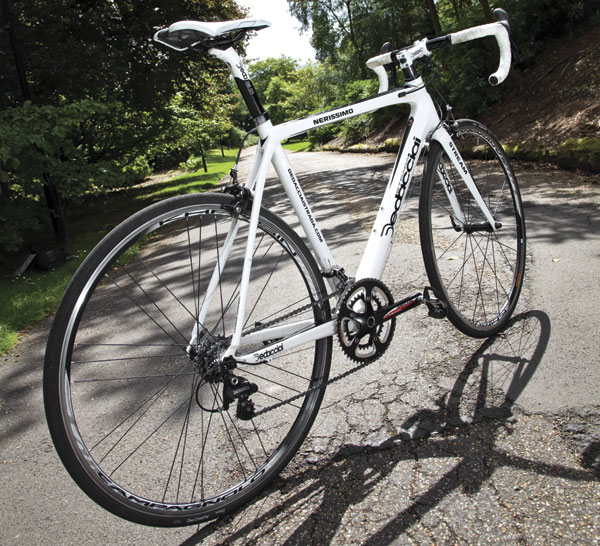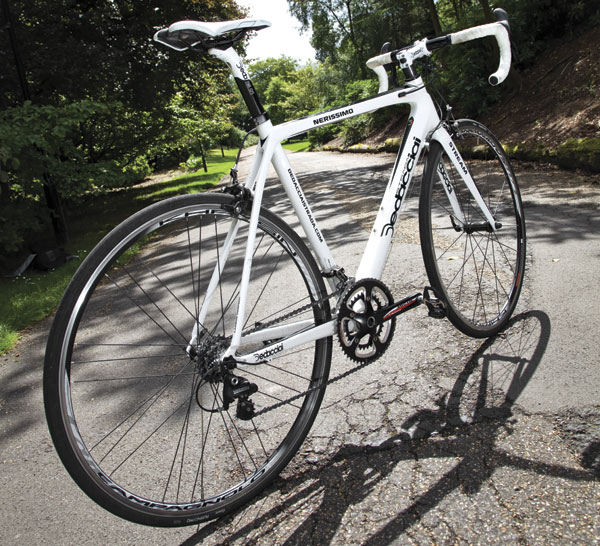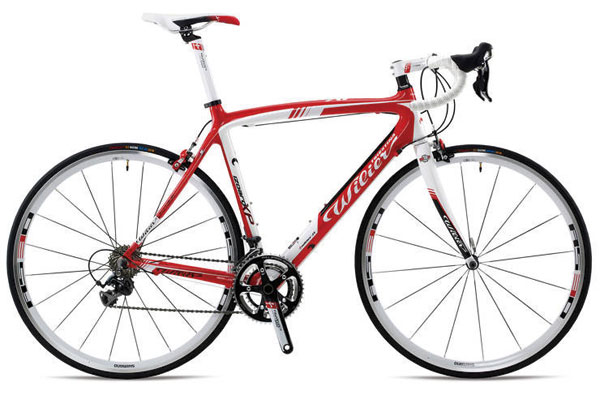Dedacciai Nerissimo: First Ride review

Dedacciai Nerissimo
You can trust Cycling Weekly.


Words Kenny Pryde | Photo Chris Catchpole
There’s a good chance there’s a bit of ‘Deda’ somewhere on a bike you ride or have ridden. And you may even have an old steel frame constructed from Dedacciai steel tubing. Which is to say that Dedacciai is a well-established Milan-based Italian outfit, even if it’s a new name in complete bikes.
But there’s no steel in this Dedacciai Nerissimo frame. Like most other designers and brands, steel frames have been left to artisans and retro fans. This Nerissimo is a carbon monocoque fitted out with a blend of Campagnolo Veloce and Miche parts, rolling along on Campagnolo Khamsin wheels and Vittoria Rubino Pro 23c tyres. Funnily enough, the bars, stem and seatpost are all Deda and you’re sitting on a Selle Italia SL saddle. And if you love white and/or minimalist paint schemes, then you’re in luck.
The Nerissimo is a carbon monocoque frame aimed at tempting the still-growing band of sportive/race/weekend warriors/anyone who likes a pretty carbon bike finished with Italian components, pedigree and style. Having said that the Nerissimo — ‘blackest of black’ — is hardly a flamboyant Italian show off; it’s more of a high-tech stealth bomber.
As with many Italian bikes, you are paying for a frame that you can upgrade, because the quality of the drivetrain is far outshone by the frameset. The hefty-looking headstock is impressively sculpted and the Deda Stream fork looks like it could have come from a top-spec time trial bike such is its flat, blade-like profile.
Dedacciai is proud of its frame and the paint finish is unimpeachable, while the concealed rear brake cables and neat rear carbon dropouts are tidy and well-finished. It’s a pretty thing, naked, with a claimed weight for a medium sized frame of 1.15 kilos.
The bottom bracket area looks massive and the square-ish seat and chainstays look scarily stiff and unyielding, but the ‘high-modulus’ Toray 700 carbon tubes did a fine job of absorbing those ever-more plentiful bumps and potholes that the early summer floods have gouged and scoured on UK roads. To be fair, the Khamsin 28-spoke wheels and 23mm section Vittoria Rubino tyres played their part in cushioning the ride (at 100psi) too.
The latest race content, interviews, features, reviews and expert buying guides, direct to your inbox!
I have done a lot of riding on steel (a Deda Nemo tubeset as it goes) and on a Specialized Roubaix with those Specialized plastic ‘Zertz’ inserts in the seatpost, fork, seat and chainstays and, frankly, the Nerissimo doesn’t give as comfy a ride over bumpy roads as that — but then, nothing does. On the other hand, on smoother roads, you can’t tell any difference in comfort levels, only in responsiveness and, yes, a feeling of being ‘connected’ to the road.
Squidgy lump
Speaking about the frame, one of the things that cause anxiety with any ‘rigid’ sporty bike is long-distance comfort. How, crudely, is your backside going to cope with the battering it suffers during longer stints in the seat? Are your hands going to get tingly or numb with the road vibrations transmitted by those splendidly aero-looking full-carbon Dedacciai Stream forks? The answer is no — hands remained buzz-free and the back end was unfazed by several non-stop hours. And that’s a vote of confidence in the Selle Italia ‘Super Light’ saddle.
Truly, the handling on the Nerissimo is first class. Since it is inevitable that you compare the way different bikes behave on the same roads and the same descents, I’m far more comfortable and confident on the Nerissimo than anything else mentioned here — the combination of steering geometry, weight distribution, front-centre length and wheelbase all add up to a bike you feel you can chuck around and alter your trajectory on without needing to give advance warning. The comparison is of nimble, responsive speedboat to canal barge.
Clearly any bike is going to skip and hop over ripples in tarmac, but the Nerissimo never felt like it was going to lose the plot and skitter off the side of the road — the steering feels like it has been designed to sit somewhere between ultra-fast handling criterium racing bike and a more relaxed road bike. Which is a great place to be for us average road riders.
Needless to say during the test period, the bike and rider have been splashing about in the rain — it simply couldn’t be helped. The front end felt secure enough, but I couldn’t help wishing for a little more feel from the brakes which were a little ‘grabby’ — slow to bite then coming on quite strong. It’s something that, as with any component, you learn to judge, but on wet descents, it’s not brilliant — maybe a change of brake pad compound would be worth a try after the originals had worn out.
The biggest let-down with the bike was nothing to do with Dedacciai at all. Frankly, the shifting on the Campag Veloce groupset was sometimes bad enough to turn the air blue around me. Both front and rear levers would stubbornly refuse to, er, shift, neither up nor down and double shifts were infuriatingly common — the combination of Campag gears with a Miche chainset and Miche freewheel is clearly not ideal. And, yes, the cables were correctly tensioned and the front mech aligned.
So? Everything on and about the bike that has Dedacciai stamped on it feels right and the grouses we have about the ‘package’ concern the parts that you’d probably want to upgrade in time anyway — and lord knows the Nerissimo frameset is worthy.
Specification
Dedacciai Nerissimo
Weight 8.2kg (18lb) (inc pedals)
Frame sizes XS, S, M, L, XL
Frame Dedacciai T700 carbon-fibre monocoque
Colour White, Black
Fork Dedacciai Stream full carbon
Gears Campagnolo Veloce
Wheels Campagnolo Khamsin
Handlebar Deda Elementi
Brakes Campagnolo Veloce
Saddle Selle Italia SL
Tyres Vittoria Rubino Pro
Price £1,879.99
Contact www.chickencycles.co.uk
Alternative

Wilier Izoard XP 105 £1,750.00
Happily for us, there is a lot of competition among bike brands for road bikes around this price point. Which means there’s plenty of choice and the competition is fierce. If you hanker after Italian ‘moda’ then you could be tempted by the Wilier Triestina Izoard carbon-fibre monocoque frame with a Shimano 105 build and decent wheelset. Wilier Triestina was the bike brand ridden by the tragic Marco Pantani and legendary 1950s hardman Fiorenzo Magni — you can’t get much more Italian history than that. The drivetrain and levers are Shimano 105, there’s a Shimano wheelset and FSA cranks and brakes. And the paintjob looks like an Italian frame should — flash!

Nigel Wynn worked as associate editor on CyclingWeekly.com, he worked almost single-handedly on the Cycling Weekly website in its early days. His passion for cycling, his writing and his creativity, as well as his hard work and dedication, were the original driving force behind the website’s success. Without him, CyclingWeekly.com would certainly not exist on the size and scale that it enjoys today. Nigel sadly passed away, following a brave battle with a cancer-related illness, in 2018. He was a highly valued colleague, and more importantly, an exceptional person to work with - his presence is sorely missed.